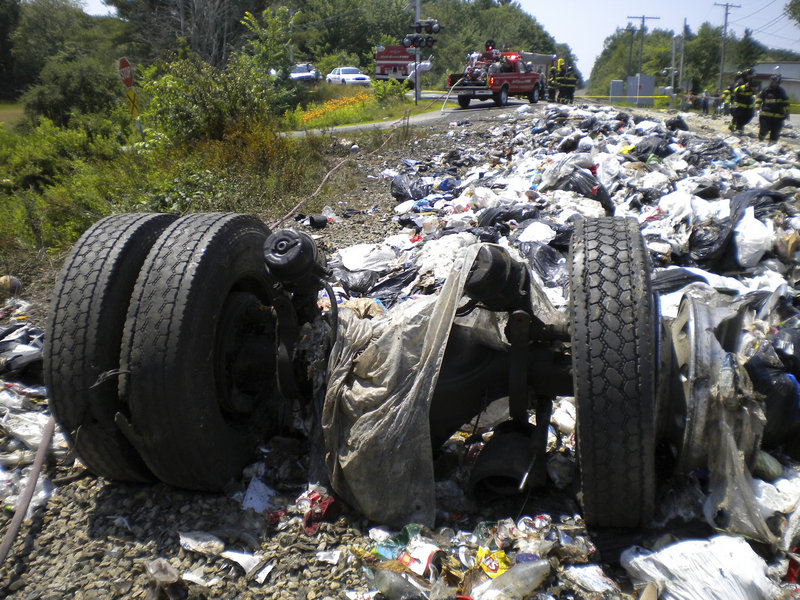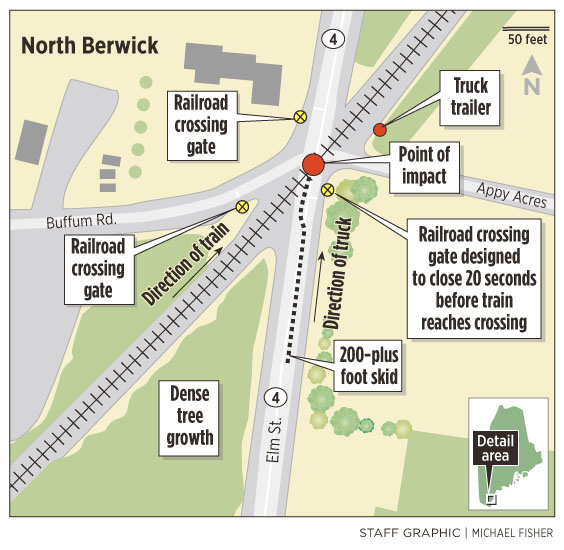NORTH BERWICK — Police believe that the truck driver killed July 11 in a collision with an Amtrak train had just ended a cellphone call with his supervisor when he realized he was heading toward a railroad crossing gate — at 50 mph, 20 mph over the speed limit.
Peter T. Barnum slammed on his brakes, but the inertia of 95,000 pounds — the truck and the trash he was hauling — caused the truck to skid onto the tracks and into the path of the northbound Downeaster, police said Monday.
The train was behind schedule and going 75 mph, slightly faster than it would normally have gone through town, but the gates closed 21 seconds before the train arrived at the crossing, plenty of time for a driver to stop, police said.
The conclusion of the two-month investigation, led by North Berwick police and recounted in a 225-page report made available Monday, is that Barnum caused the crash, most likely because he was distracted by a cellphone call. A witness who was following the truck said Barnum crossed the center line and also drifted into the breakdown lane minutes before the crash.
A video recording taken from the engine of Amtrak train 681 as it approached the intersection was shown to police but they were not given a copy, so it was not released as part of a Freedom of Access Act request by The Portland Press Herald.
The color video shows the crossing, gates down, as the train approaches, said North Berwick Police Chief Stephen Peasley. The truck appears on the right side of the frame, its tires smoking as its driver tries to stop.
“You can see the signal flashing. You can see the (crossing gate’s) arms are down,” Peasley said.
The video shows the truck cab swerving around the gate moments before the train crashes into the driver’s side of the truck cab, just behind the door.
The driver is not visible through the truck windows, Peasley said. Upon impact, the windshield of the train is instantly covered with diesel fuel that bursts into flames, the chief said.
Barnum, 35, lived in Farmington, N.H., and was a husband and father who coached baseball and played softball. He worked for Massachusetts-based Triumvirate Environmental for 10 years and his supervisor, Stephen Foye, referred to him as his right-hand man.
His wife, Stephanie, said in the report that she didn’t see her husband that morning because he left for work at 4 a.m. He called her later that morning, but she was already at work at a restaurant in Massachusetts and was too busy to talk.
She called back at noon, but got no answer.
Barnum was filling in that morning for the driver who usually was assigned to haul trash from Eliot to the waste-to-energy incinerator in Biddeford.
He crossed the Maine State Police scales in Eliot at 10:48 a.m. According to an analysis of the GPS system in the truck he was driving, he did not speed along the 12.7 miles leading to the Elm Street railroad crossing.
Greg Daigneault, who drove behind Barnum along the route, said in the report that he saw the truck drift across the center line and breakdown line several times, as if its driver was distracted or tired.
“Between the time I first saw the truck and the accident scene, the driver had crossed the center line and breakdown line three or more times,” Daigneault said. “Near Riverside Farm I heard the train whistle, and once in the 40-mph zone I could see the gate go down in front of the tractor-trailer.
“The driver did not appear to be slowing down …”
After cresting a hill that leads down to the crossing, Barnum was going 51 mph, according to the GPS. The speed limit on the road drops quickly from 55 mph to 40 mph, then to 30 mph.
Skid marks showed that Barnum slammed on his brakes as he passed the 30 mph sign, 239 feet from tracks.
Contacted Monday, Daigneault declined to comment, saying he would let his written statement stand until the court case is resolved. The case is a lawsuit in U.S. District Court in Massachusetts, where Amtrak is suing Triumvirate Environmental to recoup the more than $3 million worth of damage to its engine and passenger cars.
Barnum apparently tried to avoid the gate in the northbound travel lane, in which he was driving, skidding into the southbound lane to get around it. State police believe he was going about 50 mph when he entered the crossing, Peasley said, though the accident reconstruction report has not yet been released.
The train hit the truck with such force that the cab broke into pieces and the trailer whipped around and smashed against the train’s next car, a passenger car that was knocked partially off the tracks. Barnum’s body was thrown 350 feet from the point of impact.
The train continued on the tracks, coming to rest halfway between Elm and Main streets. The burning engine had come uncoupled from the passenger cars that followed.
The train’s 112 passengers escaped with just a few minor injuries. One passenger jumped from a window of the train and broke an ankle.
The train’s speed of 75 mph does not appear to be an issue in the police report.
“I’m told the speed limit on the track is 70 mph,” Peasley said, but local police do not enforce speed limits on railroad tracks, which often are dictated by track owners and based on the safety of the rails in a given location.
An official with the Federal Railroad Administration told Lt. James Moulton, the ranking officer in the investigation, that 75 mph is within the rail line’s guidelines, the report said.
The department’s file includes the account of the engineer, Michael Demers of Portland.
Demers said the train left the Dover, N.H., depot for Wells about 15 minutes late because a freight train was on the tracks.
He had a clear signal as the train approached the Elm Street crossing, but just as he whistled his final approach to the crossing, he saw the truck sliding toward it.
Demers put the train in emergency mode, which applied the brakes, but it was too late to stop. He jabbed a pedal that activates the train’s whistle, then tried to drop to the floor to brace for the impact.
“Before I got to the floor, the train collided with the truck,” he wrote in his statement for police. When the train hit, flames engulfed the engine and poured through the open window, he said.
As the engine came to a stop, Demers left the car through the fireman’s door and ran to join his crew, he said. Later, Demers was taken to Goodall Hospital for treatment of smoke inhalation.
Police found Barnum’s body, face down, pinned beneath a hydraulic tank from the truck. He likely died instantly from multiple injuries, police said. An autopsy by the state medical examiner showed no alcohol or drugs in his system, Peasley said.
Police found one cellphone about 100 feet away from Barnum’s body and another 20 feet in another direction.
Police subpoenaed cellphone records, which showed that at least one of the phones Barnum had with him had taken a call at 11 a.m., lasting five minutes. The records do not track the length of the call in seconds.
The crash was reported at 11:05 a.m. It’s unclear whether Barnum had a hands-free cellphone, Peasley said. Triumvirate has a policy banning cellphone use unless the driver uses a hands-free set.
Police interviewed Foye, operations manager for Triumvirate’s Eliot office, about the call that was made from Foye’s cellphone to Barnum at 11 a.m.
Foye said he could recall nothing of the conversation, but he was insistent that the call ended before the crash.
“He said, ‘That’s how I can get to sleep at night. I know I wasn’t talking to him at the time of the crash,’ ” Peasley said.
Foye did try to contact Barnum a couple of times after learning about the crash, at 11:30 a.m.
Foye told police he could not remember the substance of two earlier calls that day, made to Barnum before he left Eliot.
Foye was called to the scene of the crash two hours after it happened, and identified Barnum’s body.
Barnum had no criminal record and very few driving infractions, the investigation concluded. In addition to being a seasoned truck driver, he taught tractor-trailer driving to others, his wife told police.
Staff Writer David Hench can be contacted at 791-6327 or at: dhench@pressherald.com
Copy the Story Link
Send questions/comments to the editors.




Success. Please wait for the page to reload. If the page does not reload within 5 seconds, please refresh the page.
Enter your email and password to access comments.
Hi, to comment on stories you must . This profile is in addition to your subscription and website login.
Already have a commenting profile? .
Invalid username/password.
Please check your email to confirm and complete your registration.
Only subscribers are eligible to post comments. Please subscribe or login first for digital access. Here’s why.
Use the form below to reset your password. When you've submitted your account email, we will send an email with a reset code.